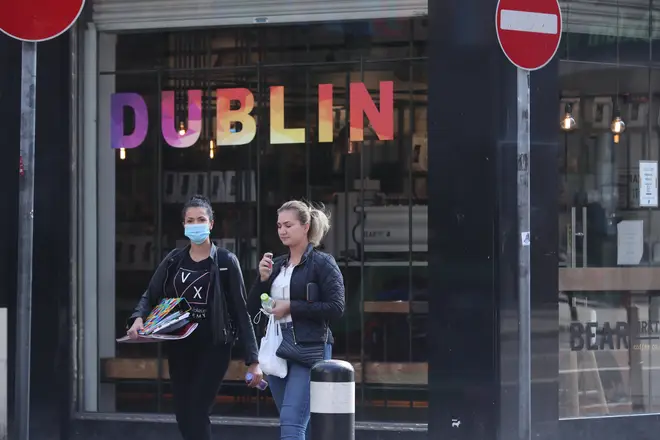
James O'Brien 10am - 1pm
5 October 2020, 23:06 | Updated: 5 October 2020, 23:09

Ireland will face tighter restrictions, including a ban on indoor social gatherings, in a bid to curb the spread of Covid-19.
The country will move to level three of the Government's plan to live with Covid-19. The switch will last for three weeks.
Taoiseach Micheal Martin said there will also be measures to increase compliance on the new restrictions which come into effect at midnight on Tuesday.
Read more: Wales 'actively considering' quarantine for visitors from UK Covid hotspots
Read more: UK reports 12,594 new coronavirus cases and 19 deaths
Under the restrictions, only six visitors from one household would be allowed to visit another household.
The stricter measures include a ban on indoor social gatherings, a requirement for pubs and restaurants to only serve food outdoors, and a limit on travel in and out of the county for only work, education and essential purposes.
The Govt met today and decided to move all parts of the country to Level 3 of the Framework for Restrictive Measures. If we all act now and adhere to the guidelines we can avoid moving to Levels 4 & 5 #COVID19
— Micheál Martin (@MichealMartinTD) October 5, 2020
The decision comes after the Government rejected advice from public health officials to introduce the highest level of measure.
Speaking at Government Buildings in Dublin, Mr Martin defended the Government's decision not to implement recommendations from the National Public Health Emergency Team (Nphet).
He said the potential implications of moving to a lockdown are "severe and very different" from those the country faced earlier this year.
"It could involve the loss of hundreds of thousands of jobs with these concentrated in families and communities, which are already experiencing difficulties," Mr Martin warned.
"This is not about public health and businesses competing against each other, it's about protecting lives and livelihoods.
"We can't do one without the other. I believe that we all understand what we have to do and I have confidence that we can have the impact this requires and we need to do it now.
Have a look at what the Framework means for you 👇🏻 pic.twitter.com/tE86oa6dqC
— Micheál Martin (@MichealMartinTD) October 5, 2020
"If we all act now, we can stop the need to go further with introducing level four and five restrictions. I have no doubt that we can and will get through this."
He said that while there is evidence people are following guidelines, there are others who are taking a more "lax attitude".
"Whether it is about inviting others to our homes, or how we behave in public settings, the virus is spreading because people are allowing it to spread," Mr Martin continued.
"The government has been informed by NPHET that recent trends and most parts of the country are a major concern.
"If we do not alter these trends there will be a serious impact, there is no doubt whatsoever about this.
"We must respond and the challenge is to be as effective and proportionate as possible."
Listen & subscribe: Global Player | Apple Podcasts | Google Podcasts | Spotify
Minister for Health Stephen Donnelly said the Government's relationship with Nphet is "absolutely fine".
"Given the times we live in it should be expected that there would be robust debate and disagreements," he told a press conference on Monday night.
"No country has got this perfectly right, no one has a monopoly on wisdom when it comes to this virus. I think it is normal and healthy that there will be different views around the table."
Mr Donnelly said the Government would have wanted to see a "bigger difference in the underlying data" before moving to level five.
However, Tanaiste Leo Varadkar criticised Nphet's recommendation, saying it "came out of the blue".
He told RTE's Claire Byrne Live that the level five recommendation had "not been thought through".
The decision comes following a Cabinet meeting this evening to discuss the recommendations made by chief medical officer Dr Tony Holohan and NPHET.
Dr Holohan warned there has been a "significant and concerning deterioration" in the epidemiological situation nationally.
He said on Monday: "It is vital that we do everything in our power now to arrest the current trajectory nationally and very substantially suppress the virus back down to a low level of transmission in advance of the winter months."
Dr Ronan Glynn, deputy chief medical officer, said: "Our core priorities have to be protected.
"We must work together to keep our non-Covid health services open, keep our children in education and protect the lives of the most vulnerable to this disease.
"Solidarity is now more important than ever as we work to once again suppress this virus in our communities."
Sinn Fein's David Cullinane claimed the public has been left "very confused" by the Government's position.
"The Government has the responsibility to explain its decisions, as NPHET has an obligation to explain theirs," he added.
On Monday an additional 518 new cases of Covid-19 have been confirmed by the Department of Health. There were no further deaths.
The Government was urged to make a dramatic intervention by buying up private hospitals to increase intensive care capacity.
Labour leader Alan Kelly said the move would "pay for itself" by avoiding the economic fallout of a nationwide shutdown of businesses.
The latest figures show there are 150 people in Irish hospitals with coronavirus, with 21 confirmed cases in intensive care units.